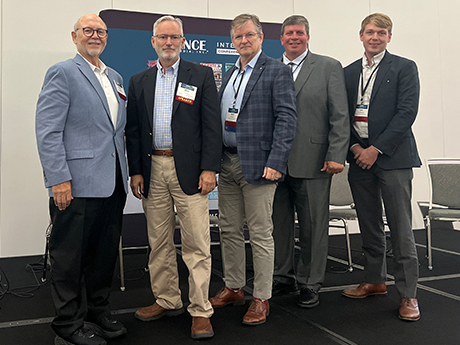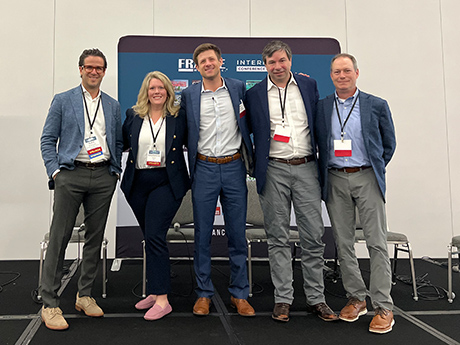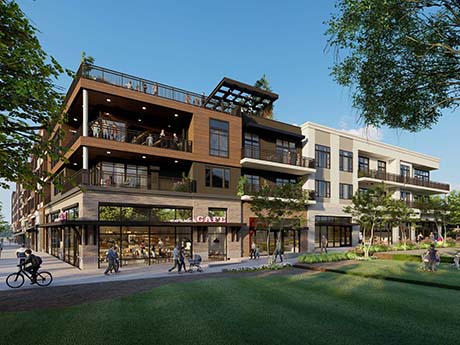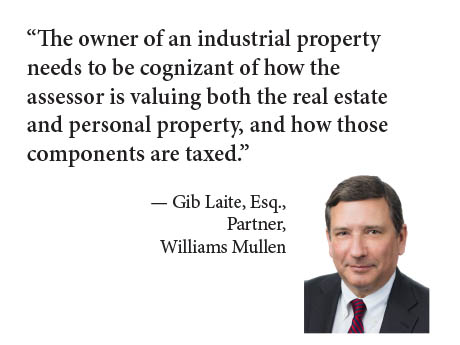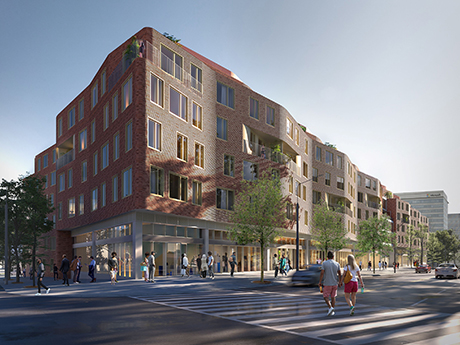ATLANTA — In order to satisfy long-term affordability commitments, builders and designers of affordable housing must be well educated about the sector’s exacting design and construction rules, which are typically driven by the source of a project’s funding. A panel of construction experts speaking at the InterFace Affordable Housing Southeast conference held Thursday, May 9 at Cobb Galleria Centre shared insights about how their industry is meeting these standards today. The inaugural conference hosted by France Media’s InterFace Conference Group and Southeast Multifamily & Affordable Housing Business drew approximately 170 industry professionals. Energy efficiency, teamwork and accessibility were three themes running through the discussion. Accessibility in multifamily construction refers to features that enable people with disabilities or limited mobility to navigate common areas and individual units comfortably and safely. Many of these building features are required by various laws. “Get your consultants, architects and contractors to help you put the deal together,” advised Ross Haynes, chief executive officer of Roswell, Georgia-based Community Construction Group. The company focuses on construction and renovation of affordable housing projects. “That team is there to understand the code requirements that affect the job, including energy programs and accessibility,” added Haynes. Specific energy-efficiency requirements for affordable housing vary. …
Southeast Feature Archive
AcquisitionsAffordable HousingConference CoverageFeaturesGeorgiaMultifamilySoutheastSoutheast Feature Archive
Volatility Disrupts Investment Sales Activity in Affordable Housing Market, Says InterFace Panel
by John Nelson
ATLANTA — The investment sales market for the affordable housing sector remains muted for one overarching reason: volatility. Cory Sams, executive managing director of GREA (Global Real Estate Advisors), said that a lack of certainty, especially in the capital markets, is giving buyers and sellers of affordable housing properties pause. “The worst thing for a deal is [interest rates] constantly moving around,” she said. “When they were running up and down, every deal fell apart.” Doug Childers, senior managing director of JLL, estimated that affordable housing transaction volume fell 40 percent in 2023 compared with the prior year. For context, multifamily investment sales overall declined by 61 percent year-over-year in 2023, according to MSCI Real Assets (formerly Real Capital Analytics). Childers and Sams made their comments during the investment sales panel of Interface Affordable Housing Southeast, an information and networking conference held at the Cobb Galleria Centre in Atlanta on Thursday, May 9. Interface Conference Group and Southeast Multifamily & Affordable Housing Business hosted the event, which drew approximately 170 industry professionals from across the region. Brian Flanagan, regional director of RBC Community Investments, moderated the investment sales panel. Fittingly, Flanagan kicked off the investment sales discussion by asking the …
By Gib Laite, Esq. of Williams Mullen Multifamily investors are accustomed to paying property taxes based on an assessor’s opinion of their asset’s income-based market value. But for the growing number of developers and investors assembling communities of single-family homes and townhomes for rent, tax assessment is more complex and potentially troublesome. The difficulty for these taxpayers is that most assessors shun the income approach to valuing single-family rental properties. In the following paragraphs, we examine the roots of this common assessor stance, and explore strategies that may help taxpayers argue for a more predictable, apartment-like treatment for their single-family rental communities. Similar, but different Multifamily construction has delivered a tremendous volume of apartment properties over the past decade. Once stabilized, these assets have been relatively simple to value by relying on market rents, occupancy, expenses, and cap rates. On the heels of this apartment construction, the nation is seeing a proliferation of investor-backed, single-family construction and acquisitions of large blocks of homes and townhouses for use as rental properties. This may take the form of constructing a multitude of homes or townhomes in a single development. Alternatively, it may involve the acquisition of many existing homes or townhomes in …
By Matt Valley DALLAS — The success or failure of an active adult community hinges on whether the operator can deliver on its valuation proposition, and tenants are willing to pay a premium if their lifestyle expectations are met. That’s one of the key takeaways from an active adult panel discussion that took place March 6 during the 2024 NIC Spring Conference at the Omni Dallas Hotel. Prospective tenants in this real estate niche are experienced, sophisticated consumers who know when they are being sold a bill of goods. They know if leasing people aren’t being sincere, said Robert May, managing director of Avenida Partners, a national real estate development firm with offices in Newport Beach, California, and Nashville, Tennessee. “They come to our communities for the first time knowing a whole lot more about us than we do about them because of the internet, because of social media, because of that senior network that’s out there,” explained May. “The brand is everything. It’s what they see, it’s what they hear, and they’ve got to feel it. They’ve got to feel that you’re really there to deliver that value proposition, that lifestyle that they are looking for.” For traditional multifamily …
ATLANTA — Multifamily developers are bracing for the uncertainty of 2024 as their projects are delivering into a landscape where new supply is outpacing demand by a significant margin. In the third quarter, a total of 114,000 new multifamily units were delivered in the United States compared to 82,100 absorbed, according to research from CBRE. The absorption figure is technically rebounding as it represents the highest quarterly figure since early 2022, but there is still a sizeable delta compared to supply growth. The trailing four-quarter total for U.S. multifamily deliveries stands at 376,500 units, which CBRE reports is the highest since it began tracking the metric 27 years ago. “This is historic supply,” said Todd Oglesby, managing director of Alliance Residential Co.’s Southeast division. “It’s at the highest levels since the 1980s.” Oglesby made his comments as part of a panel of developers at France Media’s InterFace Multifamily Southeast, an annual conference held on Thursday, Nov. 30 at the Westin Buckhead hotel in Atlanta. Chad Riddle, senior project manager at Bohler, moderated the panel entitled “Given the Interest Rate & Debt Market Environment, How Are Developers Making New Projects Pencil?” Throughout the full-day conference, several panelists mentioned that their firms’ …
FeaturesHeartland Feature ArchiveMultifamily & Affordable Housing Feature ArchiveNortheast Feature ArchiveSoutheast Feature ArchiveTexas & Oklahoma Feature ArchiveWestern Feature Archive
Forecast Survey: What’s Your Take on Commercial Real Estate in 2024?
by John Nelson
The editors of REBusinessOnline.com are conducting a brief online survey to gauge market conditions in 2024, and we welcome your participation. The survey should only take a few minutes to complete. Questions range from property sectors that you are most bullish on heading into 2024 to trends in deal volume to your outlook for interest rates. The results of our 13th annual survey will be compiled and published in the January issues of our regional magazines. Conducting these surveys is part of our mission at France Media to provide readers with indispensable information, and we couldn’t do it without your help. To participate in our broker/agent survey, click here. To participate in our developer/owner/manager survey, click here. To participate in our lender/financial intermediary survey, click here. (Note: Please remember to click on “done” to properly submit the survey.)
Industrial Owners Seeking Fair Tax Treatment Should Differentiate Personal Property From Real Estate Values
by John Nelson
North Carolina taxes both real estate and personal property, but differing valuation schedules and processes for the two types can lead to confusion and inflated tax bills for industrial property owners. Understanding how assessors value industrial properties can help those taxpayers detect issues and contest unfair assessments. Dual processes North Carolina requires assessors to revalue real property at least every eight years. The value as of Jan. 1 of the valuation year then remains constant until the next valuation, unless specified changes in the property occur to trigger a change in the assessment. Many counties revalue every four years, and a few, even more frequently. Assessors use a market analysis to determine real property’s taxable or fair market value. This involves applying one or more of the three valuation approaches: cost, comparable sales, or income. The state requires annual valuation of personal property based on installed cost, which is subject to the applicable trending and depreciation schedules. For the most part, taxing authorities rely on the taxpayer’s annual business personal property listing to determine what items of personal property are present, the installed cost, and the trending and depreciation schedule applied. The counties follow schedules for auditing the property tax …
COVID-19 laid bare many problems inherent in offshore supply chains and spurred widespread interest in reshoring manufacturing to the United States. As companies and communities explore site selection and expansion opportunities, they should remember that manufacturing profitability often hinges on tax strategy. Staging a comeback For the first time in decades, industry and the public sector are working to make American manufacturing competitive in a rapidly changing global marketplace. The recent enactments of the Inflation Reduction Act, the Bipartisan Infrastructure Law and the CHIPS and Science Act have directed billions of dollars into enhancing domestic manufacturing capacity. The semiconductor industry presents a high-profile case study. The United States holds 12 percent of the world’s semiconductor manufacturing capacity, eroded from 37 percent in 1990. The CHIPS Act’s $52 billion in federal funding is intended to strengthen domestic semiconductor manufacturing, design and research and reinforce the nation’s chip supply chains, fortifying the economy and national security along the way. Simultaneously, the United States is becoming a leading producer of electric vehicles and vehicle battery plants. Since 2021, announced U.S. investments in semiconductors and electronics exceed $166 billion, and announced U.S. investments in electric vehicles and battery manufacturing exceed $150 billion. Deciding where …
Seniors Housing Transaction Activity Will Not Return to Normal Levels This Year, Says InterFace Panel
by John Nelson
ATLANTA — One of the central questions of the investment panel at InterFace Seniors Housing Southeast was: Will transaction activity return in the fourth quarter? When Brooks Blackmon, panel moderator and executive managing director of Blueprint Healthcare Real Estate Advisors, asked the question, there was a quick response from the panel — “no.” “Return to what?” asked Kelly Sheehy senior managing director of Artemis Real Estate Partners. “Higher than today? Yes. Compared to 2019? No, it’s going to take time.” InterFace Seniors Housing Southeast is an annual conference hosted by France Media’s InterFace Conference Group, Seniors Housing Business and Southeast Real Estate Business. The event was held on Wednesday, Aug. 16 at the Westin Buckhead Atlanta hotel. Blackmon moderated the discussion. The panelists agreed that the fly in the ointment that has stifled investment sales the past few quarters has been the rapid runup in interest rates. The 10-year Treasury yield was at 4.3 percent at the time of this writing, which is the highest level since 2007. The secured overnight financing rate (SOFR) and federal funds rate, two short-term benchmark interest rates, have risen by more than 500 basis points in roughly 16 months. “Until debt markets improve, you’re …
The U.S. economic picture is an opaque one for lenders and borrowers alike as inflationary pressures persist and the massive swings in interest rates are still working their way through the economy. At its May meeting, the Federal Open Markets Committee (FOMC) raised the federal funds rate for a 10th consecutive time to a target range of 5 to 5.25 percent. The fed funds rate is the interest rate that U.S. banks charge each other to lend funds overnight. This time a year ago, the short-term benchmark rate was at a range of 0.75 percent to 1 percent. Raising the feds fund rate is the primary way that the Federal Reserve combats inflation, which was at a 3 percent annual rate in June, according to the Bureau of Labor Statistics’ Consumer Price Index (CPI). The CPI is at its lowest level in more than two years, which is generally viewed as a positive sign for economic stability, though the June figure is 100 basis points more than the Fed’s target inflation goal of 2 percent. Jason Scott, managing director and head of conventional loan production at Regions Bank, estimates that it can take six to eight months for each interest …


